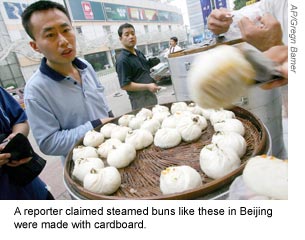China hackers hit media companies and activists online
New York, January 13, 2010—The Committee to Protect Journalists expressed concern today after Google said Tuesday it had uncovered evidence of cyber attackers from China targeting its own and other companies’ infrastructures, as well as individual Gmail accounts. CPJ welcomed Google’s statement that it was no longer willing to censor its Chinese search engine, Google.cn, in light of…
One year on, China stifles reporting on earthquake victims
New York, May 11, 2009–After the recent harassment of several foreign journalists and the arrest of least one local writer, the Committee to Protect Journalists today called on authorities in Sichuan province to allow journalists to report freely in the area on the one-year anniversary of the devastating May 12, 2008, earthquake.

Chinese reporter accused of fabricating story held on unclear charges
New York, July 23, 2007—The Committee to Protect Journalists calls for greater transparency in the arrest of a Chinese reporter accused of fabricating news. Police arrested Beijing TV reporter Zi Beijia last week and are holding him in criminal custody following accusations that he faked a report on contaminated steamed buns, according to state news…
Internet essayist goes on trial
New York, May 18, 2004—Prominent Chinese Internet writer Du Daobin went on trial today at the Intermediate People’s Court in Xiaogan, a city in the central Hubei Province, on subversion charges, according to international news reports. Du’s lawyer, Mo Shaoping, was only notified about the trial on Friday, May 14, and was therefore unable to…
Attacks on the Press 2000: Table of Contents
PREFACE by Peter Arnett INTRODUCTION by Ann Cooper REGIONAL ANALYSES: Africa | Americas | Asia | Europe and Central Asia | Middle East and North Africa AFRICA country summaries Angola | Benin | Burkina Faso | Burundi | Cameroon | Chad | Democratic Republic of Congo | Eritrea | Ethiopia | Gambia | Ghana |…
Attacks on the Press in 1997
Attacks on the Press in 1997 Introduction: Attacks on the Press in 1997 Imprisoned Index imprision country list Imprisoned Journalists confirmedright1.html Contributors: Attacks on the Press in 1997 Index: Attacks on the Press in 1997 Credits: Attacks on the Press in 1997-Credits Attacks on the Press in 1997 Attacks on the Press in 1997 Imprisoned…